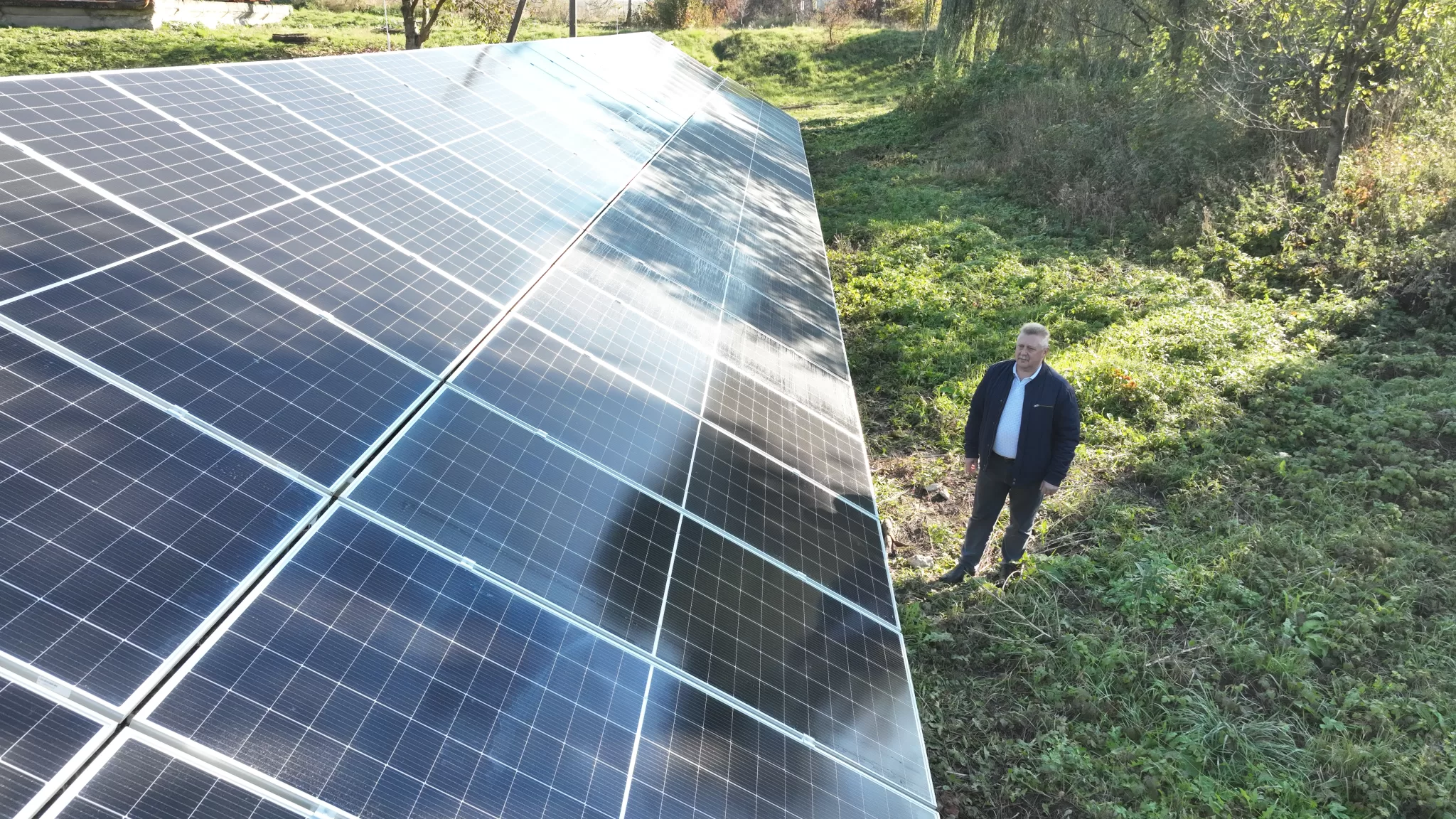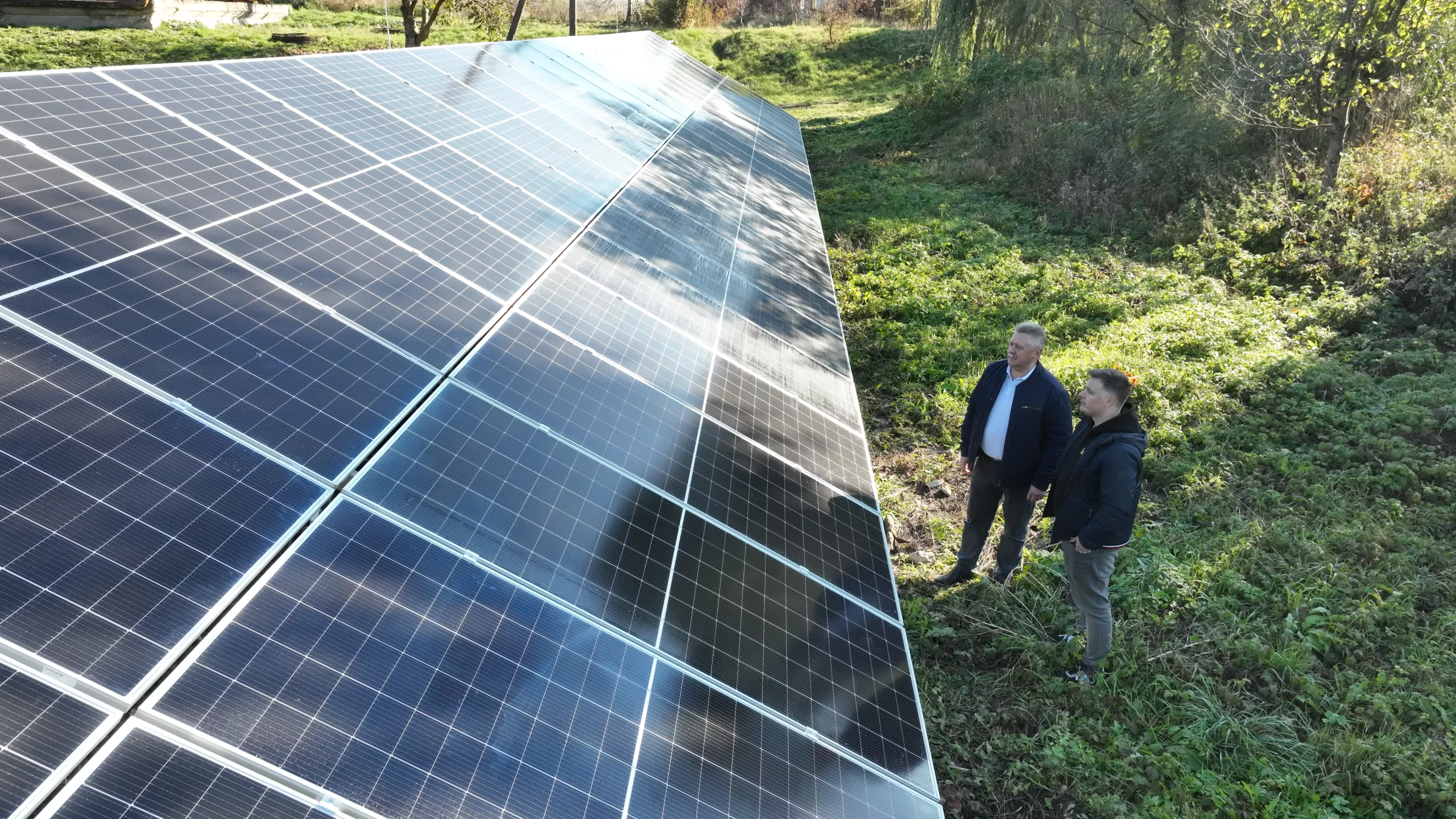Power outages pose a significant threat to water utilities, which must continue providing services to consumers despite blackouts. When electricity is unavailable, critical equipment cannot function, leaving consumers at risk of losing access to drinking water. To enhance the resilience of water utilities during blackouts, communities are equipping them with alternative energy sources — solar power plants. These solar installations not only stabilize operations but also help utilities save on electricity costs.
As part of the Renewable Energy for Sustainable Ukraine project, a consortium of NGOs collaborates with 19 communities to implement renewable energy solutions for critical infrastructure. Among these initiatives are solar power plants for water utilities in Rohatyn and Bohuslav.
How did the water utilities operate during power outages? Were consumers still able to receive services? We sought answers from Andriy Ryzhanskyi, Director of the Rohatyn Water Utility, and Oleksandr Chupryna, Director of the Bohuslav Municipal Utility Company.
– Andriy, how did the water utility operate during power outages?
The utility partially halted operations when blackouts began. However, we addressed this issue by purchasing generators. These generators power the pumping and treatment stations, water intake facilities, and the administrative building.
The generators are especially crucial for the sewage station, which must operate every two hours to prevent flooding. Since power outages lasted 5–6 hours, we would not have managed otherwise.
Even before the full-scale invasion, our region faced power outages due to natural disasters. The water intake system requires electricity for approximately 12 hours daily to pump water from the wells.
Ideally, pumping stations should be equipped with generators providing around 100 kW of power. This is necessary due to the frequent activation of pumps.

– Oleksandr, how did the utility in Bohuslav operate?
Last winter was particularly challenging for municipal utility operations. During the initial blackouts, the facilities were unable to function, and systematic outages soon followed.
The city’s treatment plants have limited reservoirs and settling tanks. We were concerned about the tanks overflowing and being unable to pump water, which posed a risk of flooding the city. Despite these challenges, the staff continued providing services to residents using a diesel generator. However, the generator consumes a significant amount of fuel, which heavily impacts the utility’s budget.
– Andriy, why was there a need to install a solar power plant in Rohatyn?
The water utility must operate under all circumstances. Alongside generators, it is essential to equip the facility with alternative energy sources because the biological treatment of wastewater is a continuous process requiring uninterrupted power supply. If electricity is unavailable, this process is disrupted.
The solar power plant, with a capacity of 36.2 kW and battery storage of 41 kWh, will reduce the utility’s reliance on grid electricity. Moreover, it will provide uninterrupted power for 1–2 hours after a blackout, ensuring continued service for consumers.
– Oleksandr, why did Bohuslav decide to install a solar power plant?
As I mentioned earlier, we need to be prepared for any critical situations to keep the treatment plants operational. Our water utility serves 85% of the community’s population, so this initiative is also about improving the quality of services for consumers.
Before the full-scale war, the municipal utility company also supplied services to several large enterprises in the community, including a cannery and an oil plant, which consumed significant amounts of electricity.
– How significant is the role of the solar power plant for the Bohuslav water utility?
The solar power plant, with a capacity of 73.71 kW, covers 30% of the utility’s electricity needs. During peak consumption, it generates 55 kWh of electricity, powering the pump that supplies water to the city’s residents. This is a substantial contribution to stabilizing the utility’s operations. However, the current solar plant does not fully meet all energy demands.
Additionally, electricity costs have been rising continuously, with a 50% increase since May this year. The solar plant allows us to save on grid electricity expenses. It also operates in tandem with the generator, which consumes a significant amount of fuel — 10 liters per hour. This setup results in considerable savings.
The solar plant is expected to produce over 85,000 kWh of electricity annually, helping the utility save nearly 4 million hryvnias per year at the current tariff.
– Andriy, why is the solar power plant in Rohatyn particularly important now?
Currently, water utility service costs are high, and further increases are necessary. With a hybrid solar power plant that includes battery storage, our facility will maintain uninterrupted operations even during power outages.
According to preliminary calculations, the plant will generate over 38,000 kWh of electricity annually, enabling the utility to save nearly 250,000 hryvnias each year on electricity expenses.
– Oleksandr, do you plan to implement other renewable energy projects in Bohuslav in the future? Which facilities are in focus?
We are actively seeking opportunities to enhance the existing solar power plant. Our goal is to install a solar plant at the treatment facilities to fully meet the utility’s energy needs.
– What are the future plans for the Rohatyn community?
Ecoclub has developed feasibility studies for two community facilities—the water intake station and the main treatment plant. With the technical documentation in place and access to used solar panels, we plan to implement additional projects.
We have also conducted a local energy audit, identifying facilities with the highest electricity consumption. One of these is the central district hospital. In the future, we aim to thermally modernize the hospital and install a solar power plant to meet its energy needs.
The project “Renewable Energy for Sustainable Ukraine” is implemented by Deutsche Gesellschaft für Internationale Zusammenarbeit (GIZ) GmbH. on behalf of the German government.












